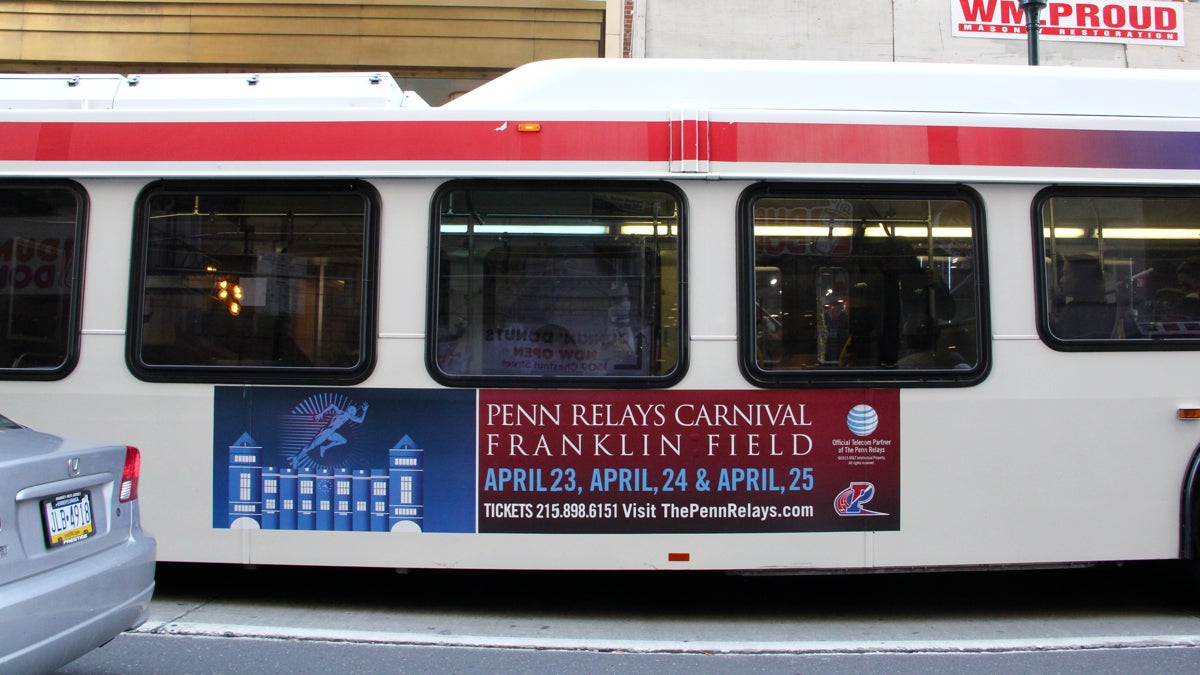SEPTA ends fight against ads linking Islam to Hitler, sets new policy [UPDATED]
Listen
FILE - A SEPTA bus (Emma Lee/WHYY)
Attorneys for SEPTA have decided not to fight bus ads connecting Islam to Nazism. The decision not to appeal follows a federal judge’s ruling this month that, under the First Amendment, SEPTA cannot block ads from the group American Freedom Defense Initiative.
The ads feature a 1940s photo of a Palestinian leader talking with Adolf Hitler under the text: “Islamic Jew-Hatred: It’s in the Quran.”
Dropping the case is “both a legally wise and practically prudent decision,” said AFDI attorney David Yerushalmi.
At a Thursday press conference, Gino Benedetti, an attorney with SEPTA, said the transit agency will not run disclaimer ads alongside the ones in question. But from now on, SEPTA will not accept political messages, which represent less than 1 percent of all SEPTA ads.
SEPTA space generates around $34 million a year from ads promoting events or services.
Ironically, Yerushalmi said he wanted SEPTA to appeal. He said he’s confident his group would have won in a higher court, possibly creating a federal circuit court decision that could help AFDI in court battles across the region.
The transportation authority has argued in court that the ads violate its policy of not allowing “public issue advertisements” on its vehicles, stating that the side of SEPTA buses is no place for public debate.
On the changed SEPTA policy prohibiting political speech, Yerushalmi said AFDI would challenge that rule only if SEPTA agreed to run “pro-Jihad or pro-Palestinian ads,” he said.
Government agencies do have the right to place some restrictions on public spaces, he said. They just can’t say they accept political ads then reject a political ad.
Ryan Tack-Hooper, an attorney with the Council on American-Islamic Relations Pennsylvania, said though his thinks the ads are reprehensible, SEPTA’s decision to back down was the right one.
“We definitely disagree with the association and the notion that the Quran is anti-Semitic,” Tack-Hooper said. “The ad is a crazy soup of conspiratorial ideas. I don’t know how threatening it is, because I don’t think people take it that seriously. But people take this as one more expression of anti-Islam sentiment, and when they see it on a government bus, that seems to give it some credence.”
At the same time, Tack-Hooper said, “they have a First Amendment right to run these ads.”
AFDI is led by conservative blogger Pam Geller, perhaps best known for her opposition to building an Islamic center near the sites of the World Trade Center attacks. The group has won court battles over controversial ads in San Francisco, New York, and Washington, D.C. They have about half a dozen other cases over ad appeals pending in federal courts around the country. And they’ve threatened to sue Chicago and Miami.
The Muslim religious leader in the photo, Haj Amin al-Husseini, has been described as being “as big a Nazi villain as Hitler himself,” something that is further proof, opponents of the ads say, that he was out of step with the overwhelming majority of those who practice Islam.
According to the contract, AFDI will pay $30,000 for ads on 84 buses, and they are scheduled to start the first week of April.
When a reporter showed transit user Mark Van Cleave the ad, he said: “It’s ridiculously sick and hatred type stuff like that shouldn’t be permitted, especially on a public public transportation system.”
He paused for a second to weigh the First Amendment implications of that position.
“I guess we’d then have to go with the idea that people have the brains to read the ad and reject the message,” he said.

SEPTA has decided not to fight bus ads connecting Islam to Nazism. (Image via SEPTA)
WHYY is your source for fact-based, in-depth journalism and information. As a nonprofit organization, we rely on financial support from readers like you. Please give today.




